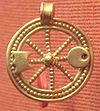Camulus or Camulos is a Celtic deity who was identified with Mars via interpretatio romana. Camulus was an important god of Roman Britain and Gaul, especially among the Belgae and the Remi, a Gaulish people living in the region that is now modern Grand Est around Reims.
Name
The etymology of the name is uncertain. It has been compared with the Old Irish cumall, meaning 'champion'.
Attestations
Evidence of Camulus' popularity can be seen in several place-names, notably Camulodunum.
Camulus is named in combination with Mars in inscriptions coming from Reims, Arlon, Kruishoutem, Rindern, Mainz, Bar Hill Fort near the Antonine Wall, Sarmizegetusa, and Southwark, London.
The town Camulodunum (now Colchester) in Essex may have been named after him (and is the conjectured basis for the legendary city of Camelot). Camulodunum is a Latinised form of the Brittonic Camulodūnon from Camulos plus dūnon "(hill)fort, stronghold", a reference to the town's extensive Iron Age earthwork defences.
Theories
Attempts from the 20th century and earlier to link the name Camulus with the nursery rhyme character Old King Cole, and with Irish mythological Cumhall, the hero Fionn's father, have been rejected by contemporary scholars.
References
- ^ "Camulus". A Dictionary of Celtic Mythology. Oxford University Press. 2004 .
- Delamarre 2003, p. 101.
- ILTG 351; AE 1935, 00064 honor / Martis Cam / / um Lavinat[ium
- CIL 13 3980 : Marti / Camulo / Lellius / Settus / v(otum) l(ibens) m(erito)
- AE 1992, 01244 : Deo Marti Camulo / Verecundus Fructi / v(otum) s(olvit) l(ibens) m(erito)
- CIL 13 8701 : Marti Camulo / sacrum pro / salute <<Tiberii>> / Claudi Caesaris / ug(usti) Germanici Imp(eratoris) / ives Remi qui / emplum constitu/erunt
- CIL 13 11818 : Marti / Camulo / sacrum / oni f(ilius) / d(onum) d(edit)
- CIL 7 1103 : Deo Mar(ti) / Camulo / ilites coh(ortis) / Hamioru / CIVSC / IVI
- AE 1998, 01100 : Invicto / Mithrae / Marti Camulo / Mercurio / Rosmertae / Q(uintus) Axius Aeli/anus v(ir) e(gregius) / proc(urator) Aug(ustorum) / Ioni(us)
- "Moritix Londiniensium: A Recent Epigraphic Find in London" (PDF). The British Epigraphy Society Newsletter (8): 10–13. Autumn 2002. Retrieved 9 July 2018 – via University College London.
- AE 2002, 882: Num(inibus) Augg(ustorum) / deo Marti Ca/mulo Tiberini/us Celerianus / c(ivis) Bell(ovacus) / moritix / Londiniensi/um / primus / VA[
- Arthur Cotterell (1997). The Encyclopedia of Mythology: Classical, Celtic, Norse. Anness Publishing Ltd.
- Crummy, Philip (1997). City of Victory: The story of Colchester - Britain's first Roman town. Colchester Archaeological Trust. ISBN 1 897719 04 3.
- Bibliography
- Delamarre, Xavier (2003). Dictionnaire de la langue gauloise: Une approche linguistique du vieux-celtique continental. Errance. ISBN 9782877723695.
Further reading
| Celtic mythology series | ||
|---|---|---|
| Ancient deities of Gaul, Britain and Gallaecia by region | ||
| Supra-regional |
|   |
| Britannia | ||
| Gallia Aquitania | ||
| Gallia Belgica | ||
| Gallia Celtica | ||
| Gallia Cisalpina | ||
| Gallia Narbonensis | ||
| Germania Inferior | ||
| Gallaecia | ||
This article relating to a Celtic myth or legend is a stub. You can help Misplaced Pages by expanding it. |